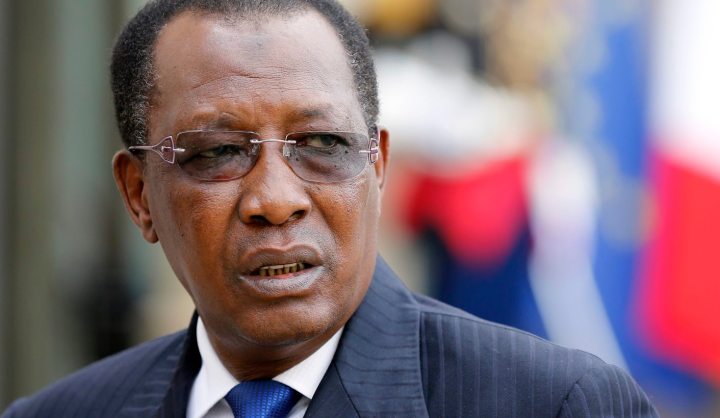Africa
Analysis: Unveiling Chad’s burqa ban

In the days after a massive terrorist attack in the capital, Chad has banned the burqa – the full-face Islamic veil that apparently protects both terrorists and modesty. This isn’t the first time the burqa has come under attack, and it won’t be the last – but will Chad’s new restrictions really make the country safer? By SIMON ALLISON.
“Wearing the burqa must stop immediately from today, not only in public places and schools but throughout the whole of the country.” So decreed Chadian Prime Minister Kalzeube Pahimi Deubet on Thursday, speaking to religious leaders in his country, and it sounds like he means business: security forces have been ordered to confiscate and burn any of the full-face veils that they find for sale in the markets; and women who defy the order have been threatened with immediate arrest and prosecution.
Deubet’s decree comes in the wake of the deadly bombing in the capital N’Djamena this weekend, which left 27 people dead and more than 100 injured. The male attackers allegedly used burqas to disguise themselves. Now no one’s allowed to wear burqas, or the marginally less concealing niqab, again.
Wherever the burqa goes, it seems to cause controversy. France has banned it, claiming that it was socially divisive, and other European countries have followed suit, their actions underpinned by more than a hint of Islamophobia: the symbolism of the ban was far greater than its actual impact, given that only an estimated 1,900 women in France were affected.
Canada wants to ban it, on the grounds of gender equality, with Prime Minister Stephen Harper saying that it is “rooted in a culture that is anti-women”. This begs the question: what’s more anti-women, to dictate what clothes women should wear or to dictate which clothes they shouldn’t? And why does it always seem to be men coming up with these rules?
The Republic of Congo has also banned the burqa for security reasons, although terrorism is not really a threat. The interior minister said that it “gives a chance to undocumented people and thugs to secretly infiltrate the ranks of the population.”
In Saudi Arabia, meanwhile, it’s mandatory for women to be fully covered in public, and recent suggestions that the law may be relaxed have been met with an outcry from the religious establishment. Saudi, however, is facing the same problem as Chad, in that the burqa has been used as camouflage in several successful and attempted terrorist attacks.
“Stories like this are rife in Saudi Arabia, where anecdotes abound of burglars, criminals and smugglers ‘dressing in drag’ to get away with their crime undetected. So long as being a woman renders one untouchable in Saudi society, this method of escape for criminals, terrorists and even, in some cases, activists will remain and thrive,” wrote Farah Abdulaziz Al-Sweel in the International Business Times.
Is the burqa a symbol of gender inequality and religious oppression? Is it a cunning camouflage for thieves and terrorists? Is it an expression of people’s right to wear what they choose, and a stand against Islamophobia?
In different times and in different places, it can be all these things, and none of them. Context is everything. Which is why it’s important to look at the background to Chad’s decision to ban the burqa, and more importantly what the government hopes to achieve.
“In some political contexts, I find [the banning of burqas] deeply disturbing and an extension of Islamaphobia. I don’t think that the Chadian response is a manifestation of Islamophobia,” said Farid Essack, Head of the Department of Religion Studies at the University of Johannesburg. “Chad is a majority Muslim country, it has had several bombings, a number of them were seemingly perpetrated by men in niqab and I don’t think that it is unreasonable to in that context insist that people should not be completely veiled in public.”
Politically, however, the decision is a gamble for President Idriss Deby’s government. Not only may the decision alienate the more religiously conservative elements of society, but it could play into the hands of the suspected perpetrators of the N’Djamena attack, Boko Haram. Boko Haram already criticises the Chadian government for not being religious enough, and this will only serve to add fuel to their fire.
Burqas weren’t the only victim of Chad’s kneejerk reaction. The government also made tinted windows on vehicles illegal, because this too is effective camouflage. This underlines the fact that, in this instance, it’s not religion being targeted, but privacy. There are parallels to be drawn here with the mass surveillance operations undertaken by western operations in the name of counter-terrorism, and the theory is simple: if there are no shadows in which terrorists can operate, they won’t be able to operate at all.
But the real question is whether the burqa ban will really prevent terrorist attacks in the future. History suggests not: a miniscule minority of terrorist attacks have been carried out by people wearing burqas, suggesting that there are plenty of other methods available to those who want to cause carnage. How many things will Chad have to ban to keep the country safe? And at what point to these abrupt lifestyle changes mean that the terrorists have won? DM
Photo: Chadian President Idriss Deby delivers a speech after a meeting with French President Francois Hollande at the Elysee Palace in Paris, France, 14 May 2015. EPA/ETIENNE LAURENT

















 Become an Insider
Become an Insider